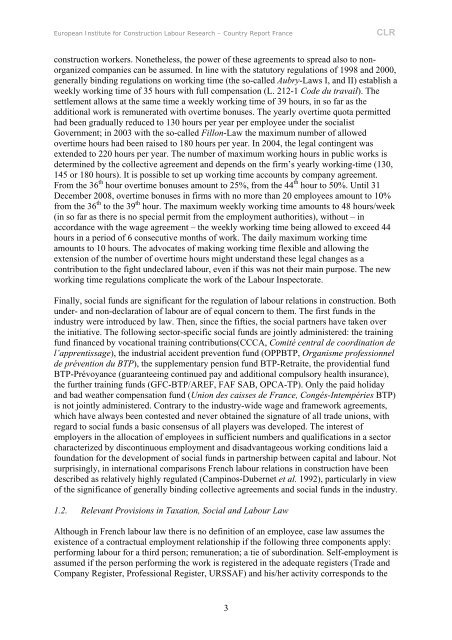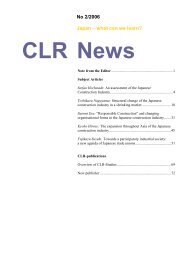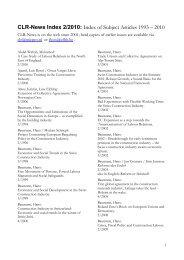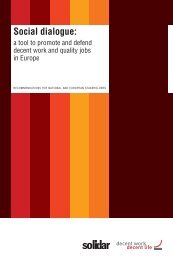Country report France - Construction Labour Research
Country report France - Construction Labour Research
Country report France - Construction Labour Research
You also want an ePaper? Increase the reach of your titles
YUMPU automatically turns print PDFs into web optimized ePapers that Google loves.
European Institute for <strong>Construction</strong> <strong>Labour</strong> <strong>Research</strong> – <strong>Country</strong> Report <strong>France</strong>CLRconstruction workers. Nonetheless, the power of these agreements to spread also to nonorganizedcompanies can be assumed. In line with the statutory regulations of 1998 and 2000,generally binding regulations on working time (the so-called Aubry-Laws I, and II) establish aweekly working time of 35 hours with full compensation (L. 212-1 Code du travail). Thesettlement allows at the same time a weekly working time of 39 hours, in so far as theadditional work is remunerated with overtime bonuses. The yearly overtime quota permittedhad been gradually reduced to 130 hours per year per employee under the socialistGovernment; in 2003 with the so-called Fillon-Law the maximum number of allowedovertime hours had been raised to 180 hours per year. In 2004, the legal contingent wasextended to 220 hours per year. The number of maximum working hours in public works isdetermined by the collective agreement and depends on the firm’s yearly working-time (130,145 or 180 hours). It is possible to set up working time accounts by company agreement.From the 36 th hour overtime bonuses amount to 25%, from the 44 th hour to 50%. Until 31December 2008, overtime bonuses in firms with no more than 20 employees amount to 10%from the 36 th to the 39 th hour. The maximum weekly working time amounts to 48 hours/week(in so far as there is no special permit from the employment authorities), without – inaccordance with the wage agreement – the weekly working time being allowed to exceed 44hours in a period of 6 consecutive months of work. The daily maximum working timeamounts to 10 hours. The advocates of making working time flexible and allowing theextension of the number of overtime hours might understand these legal changes as acontribution to the fight undeclared labour, even if this was not their main purpose. The newworking time regulations complicate the work of the <strong>Labour</strong> Inspectorate.Finally, social funds are significant for the regulation of labour relations in construction. Bothunder- and non-declaration of labour are of equal concern to them. The first funds in theindustry were introduced by law. Then, since the fifties, the social partners have taken overthe initiative. The following sector-specific social funds are jointly administered: the trainingfund financed by vocational training contributions(CCCA, Comité central de coordination del’apprentissage), the industrial accident prevention fund (OPPBTP, Organisme professionnelde prévention du BTP), the supplementary pension fund BTP-Retraite, the providential fundBTP-Prévoyance (guaranteeing continued pay and additional compulsory health insurance),the further training funds (GFC-BTP/AREF, FAF SAB, OPCA-TP). Only the paid holidayand bad weather compensation fund (Union des caisses de <strong>France</strong>, Congés-Intempéries BTP)is not jointly administered. Contrary to the industry-wide wage and framework agreements,which have always been contested and never obtained the signature of all trade unions, withregard to social funds a basic consensus of all players was developed. The interest ofemployers in the allocation of employees in sufficient numbers and qualifications in a sectorcharacterized by discontinuous employment and disadvantageous working conditions laid afoundation for the development of social funds in partnership between capital and labour. Notsurprisingly, in international comparisons French labour relations in construction have beendescribed as relatively highly regulated (Campinos-Dubernet et al. 1992), particularly in viewof the significance of generally binding collective agreements and social funds in the industry.1.2. Relevant Provisions in Taxation, Social and <strong>Labour</strong> LawAlthough in French labour law there is no definition of an employee, case law assumes theexistence of a contractual employment relationship if the following three components apply:performing labour for a third person; remuneration; a tie of subordination. Self-employment isassumed if the person performing the work is registered in the adequate registers (Trade andCompany Register, Professional Register, URSSAF) and his/her activity corresponds to the3









